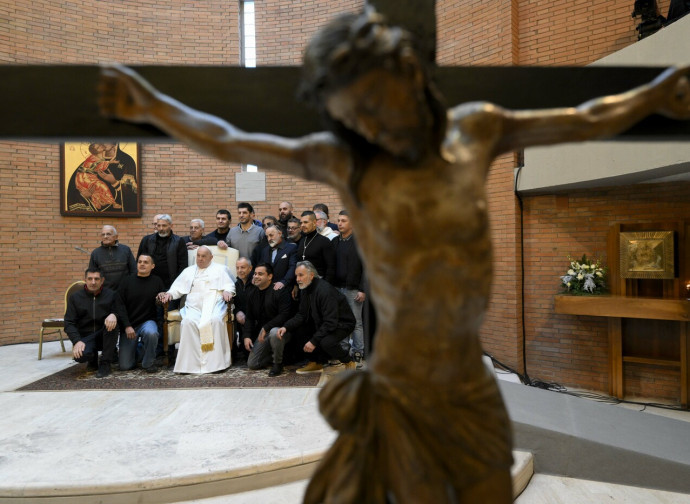Amnesty and pardon, Pope's call is transcendent
In Spes non confundit, Francis called on governments to grant forms of amnesty or pardon to restore hope to prisoners, building on what the Bible says about the Jubilee. A gesture that recalls what happens to sinners who are touched by God's grace.

As is well known, Pope Francis walked through the Holy Door of Rome's Rebibbia Prison on the occasion of the opening of the 2025 Jubilee. In the papal bull, titled Spes non confundit, with which he called for the Jubilee, Francis, with regard to prisoners, writes: “I propose to governments that in the Year of the Jubilee they take initiatives that restore hope; forms of amnesty or remission of punishment aimed at helping people recover confidence in themselves and in society; paths of reintegration into the community that are matched by a concrete commitment to observance of the laws.”
The call is necessarily universal in nature, that is, it is addressed to governments around the world. To come to us, in our legal system there are precisely the two institutions indicated by the Supreme Pontiff, amnesty and pardon. Amnesty (Art. 151 of the Penal Code and Art. 79 of the Constitution) extinguishes the crime. On the other hand, pardon (Art. 174 Cp) condones all or part of the sentence imposed or commutes it to another kind of punishment. Finally, we have the pardon (Art. 174 Cp and Art. 87 Const.) which, we could say, is like a pardon, but has special value, that is, it affects only one subject or several subjects, but not all offenders. So, in a nutshell: amnesty erases the crime, pardon and pardon do not erase the crime, but only the penalty, in whole or in part.
The legal systems that have equipped themselves with these instruments of clemency make use of such measures generally for minor offenses and for the most diverse reasons: to ease social tension and thus communicate signs of détente, to recognize that a certain conduct is no longer considered socially criminally relevant, to empty prisons because they are overcrowded, etc.
Instead, the Pope's perspective is rightly different and transcendent in nature. Indeed, the above-quoted bull continues as follows: the invitation to grant amnesty or pardon “is an ancient call, which comes from the Word of God and lingers with all its sapiential value in invoking acts of clemency and liberation that enable one to begin again: ‘You shall declare holy the fiftieth year and proclaim deliverance in the land for all its inhabitants’ (Lev 25:10). What was established in the Mosaic Law is echoed by the prophet Isaiah: “The Lord has sent me to bring glad tidings to the wretched, to bind up the wounds of the brokenhearted, to proclaim freedom for the slaves, release for the captives, to promulgate the year of the Lord's favor” (Isaiah 61:1-2).”
The release of the condemned for an act of grace by the rulers is, we might thus express, a photocopy of what happens to the sinner touched by God's grace who is released from the prison of evil because he is set free by the Savior. This is the hope of the believer, and the Jubilee year is dedicated precisely to this theological virtue: no sin, no matter how grievous, can condemn us forever as long as there is our repentance. As long as we are alive there is the possibility of redemption: Christ does not erase the crime - murder, theft, lying always remain evil acts - but He condones the penalty because it was atoned for by Him on the cross. It is up to us, albeit in a small measure, to participate in that atonement here on earth or in purgatory, just as St. Paul reminds us, “I complete in my flesh what is lacking in Christ's afflictions, for the sake of his body, which is the Church” (Col. 1:24). Christ therefore does not discount evil, but, if we allow Him to, He can do so on sanction. Without His sacrifice we would all be condemned in the afterlife to life imprisonment. That is to say: end of sentence, never.
The release of the condemned requested by the Pontiff thus becomes, on the one hand, a concrete invitation to implement a gesture of juridical equity that does not contradict the virtue of justice because, wanting to grasp the deeper rationale of these acts of benevolence, the offender must be meritorious of the act of clemency and therefore must show that he has already expiated his guilt in some way. On another front, the release of prisoners becomes an effective symbol because it is powerful in recalling the condition of all of us, imprisoned in the grip of sin and in need of divine justice bending over us showing its merciful face to redeem us, to rise again thanks to Christ to new life, to be reintegrated not simply into the civil consensus, as might happen for former prisoners, but into the community of saints.
So, the Pope's invitation from a particular one rises to a theological category, embracing all humanity and becomes a request to God to be merciful to us, opening the doors of our cells, opening us to hope.
